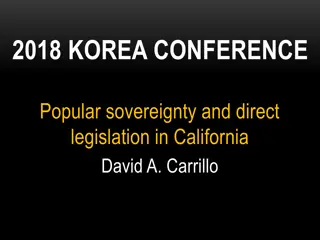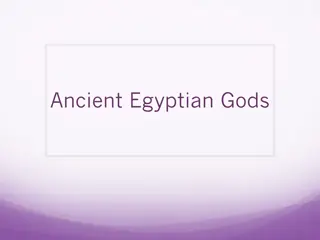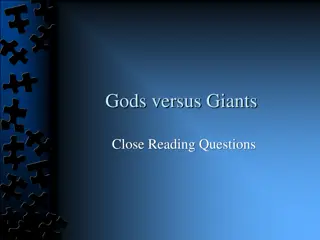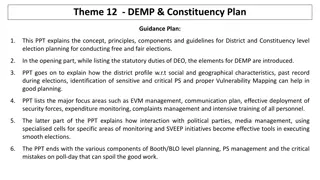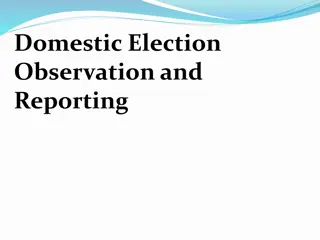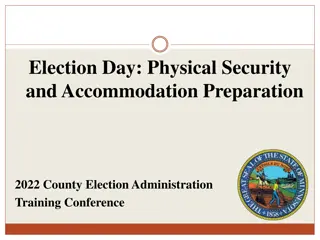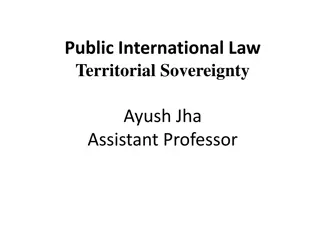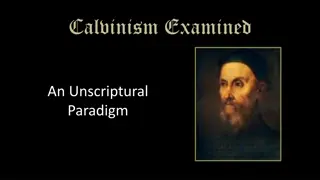Understanding God's Sovereignty and Election in Romans 9
The passage from Romans 9 delves into the concept of God's sovereignty in choosing His people based on His promise rather than physical descent. It discusses how God's word has not failed, emphasizing the selection of the offspring through Isaac and the purpose in election using examples from the lives of Isaac, Rebekah, Jacob, and Esau. It concludes with the understanding that God's mercy is not dependent on human effort but solely on His will.
Download Presentation

Please find below an Image/Link to download the presentation.
The content on the website is provided AS IS for your information and personal use only. It may not be sold, licensed, or shared on other websites without obtaining consent from the author. Download presentation by click this link. If you encounter any issues during the download, it is possible that the publisher has removed the file from their server.
E N D
Presentation Transcript
It is not as though Gods word had failed. For not all who are descended from Israel are Israel.7Nor because they are his descendants are they all Abraham s children. On the contrary, It is through Isaac that your offspring will be reckoned. [b] 8In other words, it is not the children by physical descent who are God s children, but it is the children of the promise who are regarded as Abraham s offspring.9For this was how the promise was stated: At the appointed time I will return, and Sarah will have a son. [c]
10Not only that, but Rebekahs children were conceived at the same time by our father Isaac.11Yet, before the twins were born or had done anything good or bad in order that God s purpose in election might stand:12not by works but by him who calls she was told, The older will serve the younger. [d] 13Just as it is written: Jacob I loved, but Esau I hated. [e]14What then shall we say? Is God unjust? Not at all!15For he says to Moses,
I will have mercy on whom I have mercy, and I will have compassion on whom I have compassion. [f]16It does not, therefore, depend on human desire or effort, but on God s mercy.17For Scripture says to Pharaoh: I raised you up for this very purpose, that I might display my power in you and that my name might be proclaimed in all the earth. [g] 18Therefore God has mercy on whom he wants to have mercy, and he hardens whom he wants to harden.
It is not as though Gods word had failed. For not all who are descended from Israel are Israel.7Nor because they are his descendants are they all Abraham s children. On the contrary, It is through Isaac that your offspring will be reckoned. [b] 8In other words, it is not the children by physical descent who are God s children, but it is the children of the promise who are regarded as Abraham s offspring.9For this was how the promise was stated: At the appointed time I will return, and Sarah will have a son. [c]
It is not as though Gods word had failed. For not all who are descended from Israel are Israel.7Nor because they are his descendants are they all Abraham s children. On the contrary, It is through Isaac that your offspring will be reckoned. [b] 8In other words, it is not the children by physical descent who are God s children, but it is the children of the promise who are regarded as Abraham s offspring.9For this was how the promise was stated: At the appointed time I will return, and Sarah will have a son. [c]
10Not only that, but Rebekahs children were conceived at the same time by our father Isaac.11Yet, before the twins were born or had done anything good or bad in order that God s purpose in election might stand:12not by works but by him who calls she was told, The older will serve the younger. [d] 13Just as it is written: Jacob I loved, but Esau I hated. [e]14What then shall we say? Is God unjust? Not at all!15For he says to Moses,
10Not only that, but Rebekahs children were conceived at the same time by our father Isaac.11Yet, before the twins were born or had done anything good or bad in order that God s purpose in election might stand:12not by works but by him who calls she was told, The older will serve the younger. [d] 13Just as it is written: Jacob I loved, but Esau I hated. [e]14What then shall we say? Is God unjust? Not at all!15For he says to Moses,
10Not only that, but Rebekahs children were conceived at the same time by our father Isaac.11Yet, before the twins were born or had done anything good or bad in order that God s purpose in election might stand:12not by works but by him who calls she was told, The older will serve the younger. [d] 13Just as it is written: Jacob I loved, but Esau I hated. [e]14What then shall we say? Is God unjust? Not at all!15For he says to Moses,





